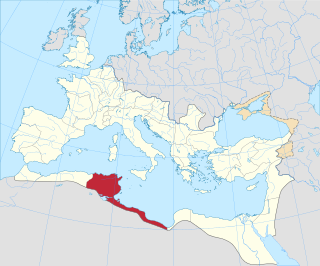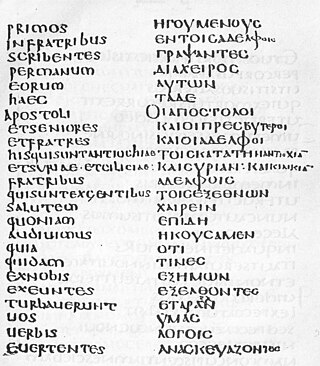Related Research Articles
Year 158 (CLVIII) was a common year starting on Saturday of the Julian calendar. At the time, it was known as the Year of the Consulship of Tertullus and Sacerdos. The denomination 158 for this year has been used since the early medieval period, when the Anno Domini calendar era became the prevalent method in Europe for naming years.

In the New Testament, Tertullus was an orator or lawyer who was employed by the Jewish leaders to state their case against the apostle Paul in the presence of Felix.
The Nazarenes were an early Jewish Christian sect in first-century Judaism. The first use of the term is found in the Acts of the Apostles of the New Testament, where Paul the Apostle is accused of being a ringleader of the sect of the Nazarenes before the Roman procurator Antonius Felix at Caesarea Maritima by Tertullus. At that time, the term simply designated followers of Jesus of Nazareth, as the Hebrew term נוֹצְרִי, and the Arabic term نَصْرَانِي, still do.
Ingelger, also called Ingelgarius, was a Frankish nobleman, who was the founder of the County of Anjou and of the original House of Anjou. Later generations of his family believed that he was the son of Tertullus (Tertulle) and Petronilla.
Marcus Appius Bradua, also known by his full name Marcus Atilius Metilius Bradua was a Roman politician who lived in the second half of the 1st century and the first half of the 2nd century in the Roman Empire.
Attius Insteius Tertullus was a Roman urban prefect.

Placidus was a disciple of Benedict of Nursia. He was the son of the patrician Tertullus, was brought as a child to Benedict at Sublaqueum (Subiaco) and dedicated to God as provided for in chapter 69 of the Rule of St. Benedict (oblate).
Julia was a Herodian Princess who lived in the 1st century and possibly in the 2nd century in the Roman Empire.
Gaius Julius Plancius Varus Cornutus was a man of Roman Senatorial rank who lived in the Roman Empire in the 2nd century.
Gaius Julius Cornutus Tertullus was a Roman senator who was active during the late 1st and early 2nd centuries. He is best known as the older friend of Pliny the Younger, with whom Cornutus was suffect consul for the nundinium of September to October 100.

Plancia Magna was a prominent woman of Perga in the Roman province of Lycia et Pamphylia who lived in the 1st and 2nd centuries. During her life she was not only a high priestess, but a decurion and preeminent benefactress to the city, funding the restoration of the main city gates between the years AD 119 and 122.

Nazarene is a title used to describe people from the city of Nazareth in the New Testament, and is a title applied to Jesus, who, according to the New Testament, grew up in Nazareth, a town in Galilee, located in ancient Judea. The word is used to translate two related terms that appear in the Greek New Testament: Nazarēnos ('Nazarene') and Nazōraios ('Nazorean'). The phrases traditionally rendered as "Jesus of Nazareth" can also be translated as "Jesus the Nazarene" or "Jesus the Nazorean", and the title Nazarene may have a religious significance instead of denoting a place of origin. Both Nazarene and Nazorean are irregular in Greek and the additional vowel in Nazorean complicates any derivation from Nazareth.
Varanes was a politician and general of the Western and Eastern Roman Empires.
Quintus Tineius Clemens was a Roman senator. He was Consul Ordinarius in AD 195 with Publius Julius Scapula Tertullus Priscus.

Avitta Bibba was a town in the Roman province of Africa Proconsularis. The town is tentatively identified with ruins at Henchir-Bour-Aouitta in Tunisia.

Acts 24 is the twenty-fourth chapter of the Acts of the Apostles in the New Testament of the Christian Bible. It records the period of Paul's imprisonment in Caesarea. The book containing this chapter is anonymous, but early Christian tradition uniformly affirmed that Luke composed this book as well as the Gospel of Luke.
The gens Insteia was a minor family at ancient Rome. No members of this gens held any of the curule magistracies under the Republic, but several served as military commanders under Rome's leading generals during the first century BC, and during Imperial times. By the second century, the family was important enough to obtain the consulship.
The gens Ovinia was a plebeian family at Rome. Members of this gens occur in history toward the end of the Republic, and from then to at least the fourth century. They produced generations of Roman senators, with Gaius Ovinius Tertullus obtaining the consulship toward the end of the second century.

The gens Plancia was a minor plebeian family of equestrian rank at ancient Rome. Few members of this gens are mentioned in the time of the Republic, but a family of the Plancii rose to prominence from the time of Vespasian, and held a number of important magistracies through the time of Hadrian. Other Plancii are known from inscriptions.
References
- ↑ Alison E. Cooley, The Cambridge Manual of Latin Epigraphy (Cambridge: University Press, 2012), p. 473
- ↑ Géza Alföldy, Konsulat und Senatorenstand unter der Antoninen (Bonn: Rudolf Habelt Verlag, 1977), p. 217